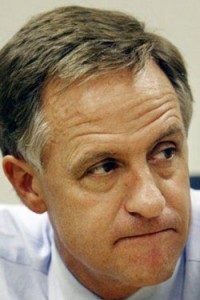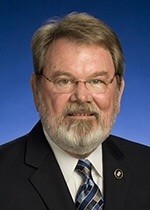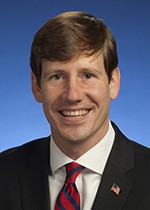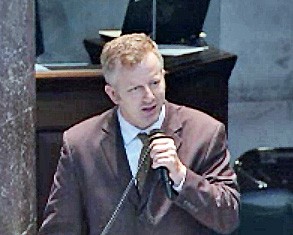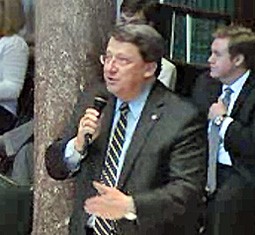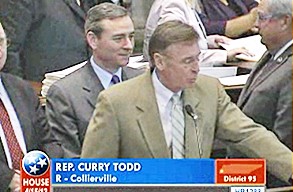
- Rep. Todd brings the muni bill to the House floor.
With little more than perfunctory debate, this year’s version of a municipal-schools bill (SB1353/hb1288) passed both chambers of the Republican-dominated Tennessee General Assembly with comfortable margins Monday, thereby allowing the de facto secession from Shelby County’s soon-to-be “unified” school district that six suburban municipalities in the county have been seeking for at least two years.
Mayors and other representatives of those suburbs — Germantown, Collierville, Bartlett, Lakeland, Arlington, and Millington — were on hand for the occasion and were introduced in the state House of Representatives by suburban GOP members before Monday’s vote in that chamber.
When the 2013 bill was considered in the House on Monday, presented by Rep. Curry Todd (R-Collierville), the co-author of record, there was one serious reminder of last year’s floor controversy. Rep. Bill Dunn (R-Knoxville) rose to express forebodings about the measure and declared his opposition to it, as he had to last year’s original model, which would have applied statewide before being modified prior to passage.
After noting pointedly that he had received emails from within Shelby County “urging” him not to express his concerns “for all to hear,” Dunn did so, anyhow. He worried that, since this year’s bill, unlike the final product last year, was cast so as to apply statewide, not just to Shelby County, “we’re going to see some problems down the road.”
Todd began his remarks by expressing thanks for the “61 signatures” of House co-sponsors he had received.
|
Among those problems was a technical one — that municipal taxpayers in new districts would become restive about paying taxes to support schooling for the non-resident children who would enroll in them and that fees would be imposed on those outlying households ultimately. “The state is supposed to provide a free education,” Dunn noted.
He did not articulate the larger concern that he had been vocal about last year, before the 2012 measure was rewritten so as to apply only to Shelby County, and that was simply a concern about unintended consequences of a statewide measure that could result in new municipal school districts elsewhere in Tennessee.
Dunn pointed out that he had ultimately supported the Shelby-County-only version of last year’s bill, but “unfortunately, a judge shut it down.” He reminded his colleagues that he had “asked that the current bill be rolled” until a version with dependable safeguards for school districts statewide could be perfected, but,”unfortunately it was not rolled.” Consequently, “I will be voting no tonight. I hope I’m wrong but I don’t think I’m gonna be.”
That was about it for objections from the state at large. But some came from representatives from the City of Memphis, who, unlike their suburban Shelby County colleagues, were opposed to the bill. Representatives G.A. Hardaway, Antonio Parkinson, and Johnnie Turner all took shots at the measure, articulating their concerns about the effect of the bill on the county’s unified school district, still in the process of formation, and extracting assurances from Todd that the bill had no immediate impact upon the future disposition of school buildings currently owned by Shelby County.
Both Hardaway and Parkinson gave voice to a rumor that has circulated widely of late — namely, that an unspoken arrangement exists between the bill’s sponsors — Todd and Senate Majority Leader Mark Norris being the principal ones — and Republican colleagues in districts elsewhere to the effect that a one-year window would be held open for Shelby County and would be closed for everybody else by follow-up legislation next year.
Todd, who had begun his remarks by expressing thanks for the “61 signatures” of House co-sponsors he had received, blithely gave assurances that no such revocation next year was planned and that if it was proposed, “I would vote against it.”
Rep. Craig Fitzhugh (D-Ripley), leader of the 27 House Democrats, made one last stand against the measure. “I hadn’t planned to speak on this bill,” Fitzhugh said. “…I thought I didn’t have a dog in the hunt…But as so goes Memphis, so goes my little town and my district.” And he expressed concern about the “long-term effect” of the bill upon Memphis.
The bill would pass the House by a margin of 70 to 24.
Things were similar in the Senate, where principal author Norris, in bringing the bill to the floor, described it as a corrective to limitations on new districts imposed during the Tiny Town crisis of 1998, when a stealth bill to allow easy incorporations by small communities challenged the annexation rights of municipalities before being found unconstitutional by the state Supreme Court.
State Senator Ken Yager (R-Harriman) quizzed Norris on the bill’s impact on the “existing funding stream” for county school districts where new municipal districts might be formed. Norris responded that “funding shifts [to] follow the student and that it would be incumbent on municipalities desiring their own school districts to approve them in referenda and to vote such new add-on taxation as would be necessary to pay for them.
State Senator Jim Kyle (D-Memphis), the leader of the Senate’s seven Democrats, pressed Norris on what he insisted would be the potential negative effect of the bill on counties like Roane, the one represented by Yager, and, for that matter, on Knox County and metropolitan districts like that of Davidson County.
Senators will ask themselves, said Kyle, “Why did I get involved in a boundary dispute in Shelby County?’”
|
Norris disputed that, both on grounds that municipal secession in such districts was unlikely because of “other hurdles” created by the bill and because there was no evidence that municipalities mentioned by Kyle — like Farragut in Knox County and Franklin in Williamson — would either pursue or be affected by efforts on behalf of new municipal districts.
Kyle disagreed. “I think the answer to that is yes. A special school district could withdraw and become a municipal district….This is a mistake, a mistake you’ll see in your community one day.” And senators would ask themselves, said Kyle, “’Why did I get involved in a boundary dispute in Shelby County?’” — one “bringing to your front door what essentially is a local dispute.” And, he said, that”could drain tax dollars from the county exactly as the gentleman from Roane County [Yager] questioned.”
In his closing remarks, Norris acknowledged that the bill “doesn’t just apply to one county but has statewide application” and insisted that the measure was “entirely in keeping with the educational reform movement,” removing an “artificial barrier” against new districts imposed at a time when the state did not possess charter schools, achievement schools, or virtual schools.
Singling out the latter category, virtual schools, which came within a whisker of being phased out or minimized in legislation favored by Governor Haslam because of poor academic results, Norris said, “You can go to school from your house on the Internet. Why should any of us seek to forbid the forming of municipal systems?”
The bill passed the Senate 24-5 and now requires only the signature of Governor Haslam and the ultimate vetting by U.S. District Judge Hardy Mays.


